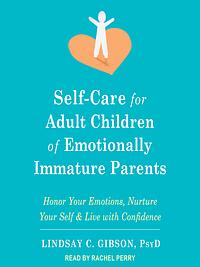Take a photo of a barcode or cover
informative
reflective
medium-paced
I've read the other two books on this topic from this author and got a lot out of them, and this was a pretty good adjunct. I wouldn't read it alone or as my first step into this concept of EI parents, but with so many potential strategies, I'm sure folks will find something useful here.
emotional
hopeful
informative
reflective
sad
tense
fast-paced
Interesting in conjunction with the first two books, but those are definitely better.
hopeful
informative
inspiring
reflective
fast-paced
hopeful
informative
inspiring
reflective
medium-paced
Overall this book has very little to do with self-care and significantly less to do with emotionally immature parents. The advice given was choppy, inconsistent, and unsourced, going as far as to cite a TV show about dog training in a section about establishing boundaries; comparing people to dogs aside, the show cited was Cesar Milan’s show which features his training style that is based entirely on a study that has been proven inaccurate to the lifestyle of wolves (which was what the study was done on), let alone dogs or people.
The “bite-sized sections” were wildly organized and only loosely related to what the title implies the book is about. It was hard to follow as the book is chock full of bizarre metaphors and comparisons (girls are horses but they should be mules, what??), unfounded claims as to the abilities or desires of “introverted” or “extroverted” people, and suggestions to “practice” establishing boundaries on people whose conversational styles don’t match your own.
There’s an entire section on parenting, which would be great if the book were titled “parenting for people who have emotionally immature parents,” if it actually focused on having had EI parents in any way instead of telling parents to allow their children to be immature (do you really need to be told this?). This section claims that people who have children lose their personalities and have no possible way to enjoy themselves, but they’re somehow more fulfilled than those without - a point which I can’t find any sources to back up and can’t find any reason why it would ever be included at all.
The amount of times the author implies that mental illnesses like depression, anxiety, and ADHD are caused by something you do instead of the science-backed truth that mental illnesses such as these are just brain structure and function is shocking from someone who has a degree in psychology. Another bizarre tip featured is that emotions only last 90 seconds (again, what is the source for this?), and if they last longer it’s because you’ve chosen to feel it. This could be understandable if we’re talking about environmentally induced emotions, but is wild when you’re talking about experiences such as grief, life instability, or generally anything bigger than overstimulation or something akin to being cut off in traffic.
There’s nothing in this book that you can’t get a better version of elsewhere, the editing and organization is a mystery and destroys any good bits I could manage to pull from it, and the claims made in it are baffling and off-topic the majority of the time. I couldn’t possibly recommend this to anyone, and it was truly grating to finish.
The “bite-sized sections” were wildly organized and only loosely related to what the title implies the book is about. It was hard to follow as the book is chock full of bizarre metaphors and comparisons (girls are horses but they should be mules, what??), unfounded claims as to the abilities or desires of “introverted” or “extroverted” people, and suggestions to “practice” establishing boundaries on people whose conversational styles don’t match your own.
There’s an entire section on parenting, which would be great if the book were titled “parenting for people who have emotionally immature parents,” if it actually focused on having had EI parents in any way instead of telling parents to allow their children to be immature (do you really need to be told this?). This section claims that people who have children lose their personalities and have no possible way to enjoy themselves, but they’re somehow more fulfilled than those without - a point which I can’t find any sources to back up and can’t find any reason why it would ever be included at all.
The amount of times the author implies that mental illnesses like depression, anxiety, and ADHD are caused by something you do instead of the science-backed truth that mental illnesses such as these are just brain structure and function is shocking from someone who has a degree in psychology. Another bizarre tip featured is that emotions only last 90 seconds (again, what is the source for this?), and if they last longer it’s because you’ve chosen to feel it. This could be understandable if we’re talking about environmentally induced emotions, but is wild when you’re talking about experiences such as grief, life instability, or generally anything bigger than overstimulation or something akin to being cut off in traffic.
There’s nothing in this book that you can’t get a better version of elsewhere, the editing and organization is a mystery and destroys any good bits I could manage to pull from it, and the claims made in it are baffling and off-topic the majority of the time. I couldn’t possibly recommend this to anyone, and it was truly grating to finish.
hopeful
informative
reflective
medium-paced
emotional
hopeful
informative
reflective
fast-paced
emotional
informative
reflective
fast-paced
informative
slow-paced
Not terrible, but not terribly helpful either. Subject matter was all over the place and the title seemed a little misleading honestly. I'd like to pick up the others in this series as they are reviewed more highly.






